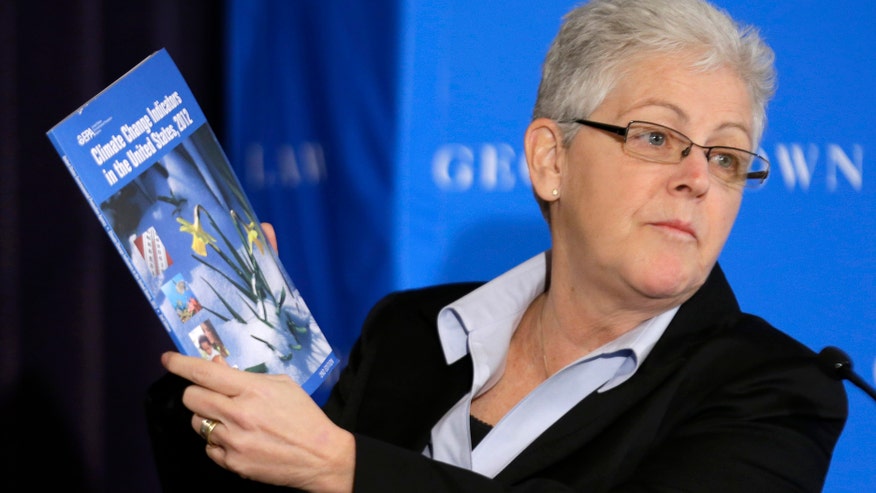Internal memos reveal EPA worked behind the scenes to kill Alaska mine project

Feb.
21, 2013: Gina McCarthy, then-Assistant Administrator with the
Environmental Protection Agency and current Administrator, holds a
climate change report as she speaks at a climate workshop sponsored by
The Climate Center at Georgetown University.AP
The internal memos published by The Washington Times show EPA officials working behind the scenes as early as 2008 to kill the gold and copper mine project -- two years before any scientific study or survey was conducted looking into the environmental impact.
“As you know I feel that both of these projects (Chuitna and Pebble) merit consideration of a 404C veto,” EPA official Phillip North wrote, according to the emails.
North, according to the Times, pushed to have the mine’s veto added to the agenda of a 2009 agency retreat.
But the EPA announced in 2011there would be a neutral and scientific review of the mining project. At the time, they said that concerns raised by environmental groups and local tribes would be investigated, but that no decision had been made.
“Alaska is a long way from Washington, D.C.,” Rep. James Lankford, R-Okla., told Fox News. “There is no reason for Washington, D.C., to run affairs in Alaska.”
Lankford says the EPA pre-judged the case and didn’t wait for a full scientific review.
“They are to be neutral in this, and they are definitely not neutral in this,” he said.
In a statement Thursday, the EPA said the emails in question were "authored by a low level staffer stationed in Alaska who had no decision making authority for the Agency.
"Additionally, the focus should be on what the agency has actually done which is taking a deliberative approach based on the science. In fact, the agency leadership had not made a decision on whether to proceed to 404(c) action until the scientific analysis was complete," the EPA said.
The newly published emails are just the latest twist in the Pebble Mine saga which began years ago.
Mine opponents have been urging EPA to take steps to protect the region. They say the project would threaten the billion-dollar commercial fishing industry in Bristol Bay and the 14,000 jobs linked to it.
Supporters, including Pebble Limited Partnership, the investment group behind the proposed multi-billion dollar copper and gold mine, accuse the government of using “junk science” to sabotage the deal.
“Rather than allowing the filing of a mining permit application, the EPA employees secretly plotted with environmental activists to undermine the ability of land owners to objectively evaluate and develop the proposed mining of the Pebble deposit … and thereby establishing a precedent that will have long-term harmful impacts on investment and job creation in the United States,” Pebble Partnership wrote in an April 29-dated letter to the EPA.
The letter also accuses the EPA of misusing taxpayer money to “create a flawed, junk science laden report, called the Bristol Bay Assessment, designed to negatively influence government, financial markets, and public policy.”
Pebble Partnership has said the mine deposit is one of the largest of its kind in the world, with the potential of producing 80.6 billion pounds of copper and 107.4 million ounces of gold over decades.
In February, the EPA announced it was taking the first steps toward restricting the development of the mine, citing concern for a premier sockeye salmon fishery in southwest Alaska. The agency employed a rarely used veto process under the Clean Water Act that gives the government the ability to stop or slow the process.
EPA Administrator Gina McCarthy told reporters the EPA was working on how it can best use its authorities “to project Bristol Bay rivers, streams and lakes from the damage that will inevitably result from the construction, operation and long-term maintenance of a large-scale copper mine.”
Pebble Partnership CEO Tom Collier called the move an example of government overreach.
He told The Hill this week the project had “become the poster child for an expansion of EPA authority."
While the EPA process is underway, the U.S. Army Corps of Engineers is prohibited from approving a permit for the project.
Fox News' Chad Pergram contributed to this report.
No comments:
Post a Comment